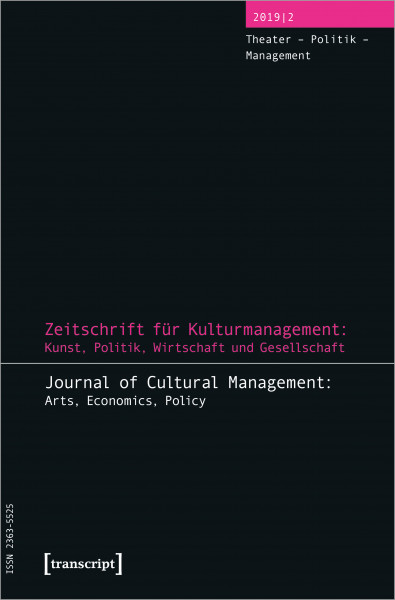Research Article
Crisis of succession: On the institutionalization of charismatic rule in German theatre
Abstract
Currently leading German theatres have come under intense criticism over questions of artistic leadership. In this paper I shall explore the deeper underlying institutional questions that underpin such debates and ask if they represent a structural crisis besetting our understanding of the modern performing arts. I will revisit Max Weber’s theory of charismatic authority and explore how it became the guiding principle of Nazi cultural policy and examine its institutional continuity after 1945. The first two parts of the article revisit Max Weber’s theory of charismatic authority; the third part sketches the historical background of the German office of Intendant with its roots in both feudal and bureaucratic structures; the final section returns to the current crises at the Munich Kammerspiele and the Berlin Volksbühne.
Keywords
2019 (2)
Theatre – Politics – Management

Related Articles
Evaluation als moderatorische und mediatorische Intervention am Beispiel eines Tanzfestivals
Journal of Cultural Management 2017 (2)
Case Study
Journal of Cultural Management and Cultural Policy
Research Article
Social Desirability’s Influence on Audience Research
Discerning and Reducing ItJournal of Cultural Management 2017 (2)
Research Article
Die Figur des Dritten, die Taktik des Zuschauers und der Kulturbetrieb
Yearbook for Culture Management 2012
Research Article
Lernen braucht Mut
Evaluation in der kulturellen BildungJournal of Cultural Management 2017 (1)
Essay
Journal of Cultural Management and Cultural Policy
Essay
© 2026, Journal of Cultural Management and Cultural Policy
Keywords
- Aesthetics
- Higher Education
- Cultural Diplomacy and Foreign Cultural Policy
- Occupation
- Career and Professional Role
- Audience Development
- Audience Studies and Visitor Studies
- Visitor Motivations
- Business
- Covid Pandemic
- Democracy
- Digitalization
- Diversity
- Third Sector
- Empirical Aesthetics
- Development
- Ethics
- Evaluation
- Field Theory
- Festival
- Film
- Federalism
- Community Arts
- Societal Change
- Ideology
- Staging
- Career
- Communication
- Concert
- Creative Industries
- Creativity
- Crisis
- Culture
- arts organizations, cultural organizations
- Cultural Participation
- Cultural Change
- Fincancing The Arts
- Cultural Promotion Law
- Cultural History
- Cultural Management
- Cultural Economy
- Cultural Organizations
- Art Education
- Cultural Policy
- Cultural Production
- Cultural Sociology
- Art Education
- Cultural Understanding
- Arts Administration
- Cultural Industry
- Cultural Sciences
- Art
- Art Field
- Arts Research
- Artists
- Artistic Research
- Artistic Reputation
- Arts Management
- Arts Organizations
- Art education
- Arts Marketing
- Arts Administration
- Curating
- Leadership
- Literature
- Advocacy
- Management
- Marketing
- Market
- Media
- Methods Development
- Mexico
- Monumentalizing
- Museum
- Music
- Non-Visitor Studies
- Opera
- Orchestra
- Organization
- Political Expression
- Post-truth Politics
- Professional Role
- Audience
- Audience Development
- Law
- Government
- Role
- Socially Engaged Art
- Social Cohesion
- Social Change
- Social Cohesion
- Non-visitor Socio-demographics
- Socioculture
- State
- Symbolic capital
- Dance
- Participatory Justice
- Theatre
- Theatre Governance
- Theory Development
- Tourism
- Transformation
- Survey
- Entrepreneurship
- Urbanism
- Civil Society


